Transform Your AR-15 Into A Smartphone-based Firearms Training Source
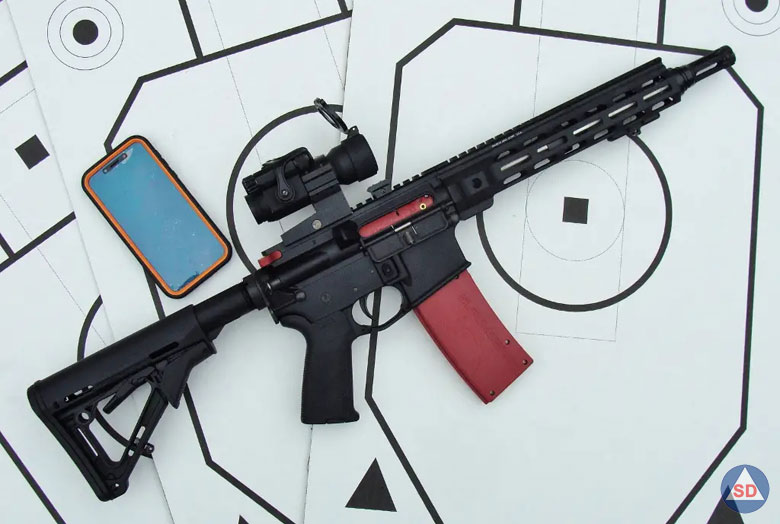
Recently, I was offered the opportunity to play with an intriguing firearms training system, the Mantis BlackbeardX. Designed for AR-15s but packaged in a surprisingly small box, it stood in stark contrast to other versions I’ve had the chance to try, including one especially complex system priced well beyond the means of most individuals.
Having been in the firearms training business for longer than I’d care to admit, I’ve encountered everything from blanks, wax or rubber bullets, air soft, paintballs and Simunition (sorta like paintballs), through supposedly high-tech firearms training simulators; FATS -systems. While the latter typically involve decision-based scenarios, marksmanship factors in, and techier systems may even provide “helpful” diagnostic feedback – assuming they actually work.
The last one I played with was borderline portable and extraordinarily temperamental, replete with today’s seemingly inevitable software glitches. More about this shortly, but first let’s backtrack to basic marksmanship.
Marksmanship “Basics”
Most shooters are probably familiar with the so-called “fundamentals of marksmanship.” Although sometimes described via different terms, the list generally boils down to stance, grip, breathing, sight alignment, and trigger control – the latter with proper follow-through. Short version: Align the sights (dot, or crosshairs) on the target and release the trigger in such a manner that they remain undisturbed. Then simply let the shot happen. Sounds simple enough, right?
Just my take but based on years of running firearms training programs for a living, it’s easier said than done. Trigger skills are by far the hardest to convey – not only to beginners, but also to a sizeable group of supposedly more “experienced” shooters.
As instructors, we can demonstrate stance and grip, describe effective breathing techniques and diagram a proper sight picture. But the nuances of proper trigger control are more a marriage of tactile and mental discipline. Difficult to articulate, a properly released shot is often described by the shooter as one that “felt” good.
The foundation of this skill, for our trainees, was developed during extensive periods of dry firing (“shooting” without live ammo), eventually progressing to ball & dummy drills (mixes of live and inert cartridges). But trigger-jerking relapses were still all-too common, accompanied by pronounced flinches – anticipation. See my Handgun Marksmanship article for more information.
Dry-Fire Limitations
Not that dry-firing isn’t highly beneficial. If the firearm can withstand it without damage, it’s an effective (and cost-free) way to refine and maintain proper trigger skills. And rumors to the contrary, many of today’s guns will suffer no real harm. Our agency’s inventory of older S&W Model 65 double-action (D/A) revolvers endured thousands of repetitions with no ill effects.
Likewise, a large batch of S&W 3rd Gen metal-framed D/A pistols and two iterations of striker-fired M&Ps. But our D/A revolvers were by far the most amenable to dry-fire practice simply because re-cocking/slide cycling manipulations weren’t necessary.
Simply align the sights and concentrate on proper trigger control; no slide-racking between each “shot”. But the AR-15 functions off a reciprocating bolt. Thus, what caught my attention was the labeling on the Blackbeard’s box: “Trigger Auto-Reset System Made for AR-15s”. Say what?
Dry Fire Taken to the Next Level: The MantisX Systems
Advertised as a “data driven firearms trainer”, the more generic version of this system attaches to any firearm whereupon it “analyzes every shot and generates actionable data you can use to improve”. It works through a three-step process (paraphrased as follows):
- Connect the Mantis X (the weapon light sized gadget in the box) to the accessory rail of the firearm. Adapters permit its use on guns without rails.
- Connect it to your smartphone or tablet via Bluetooth after installing the Mantis app (free through Android or iOS).
- Use the App to capture diagnostic feedback for every shot, while tracking progress through constructive data.
The short Mantis video further summarizes the capabilities of the system more effectively than any verbal description. The actual device, which projects laser “impacts” with each shot, is surprisingly small, as noted within this NRA link.
Survive Doomsday’s founder, Derrick, also interviewed Mantis staff about the system at SHOT Show 2023:
Although fully capable of capturing and analyzing miniscule movements of the gun, one understandably absent feature is a means to cycle a pistol’s slide as required to “re-cock its hammer or striker. That action, per standard dryfire regimens, requires manual resetting by the shooter. However, the version we’ll examine next effectively eliminates that distraction.
The Mantis BlackbeardX AR-15 System
The BlackbeardX is the latest and smartest evolution of the Mantis AR-15 systems. Packaged in a box no larger than many frozen dinners, its contents offer a few surprises. For starters, the Blackbeard’s actual “parts” are minimal (same regarding its instructions). The two primary components consist of a heavy-duty plastic magazine (its battery and brains), and a replacement bolt-carrier group (with a laser-pointer in its “bolt face”). Which begs the question: how could this system possibly re-cock an AR-15’s fire-control system?
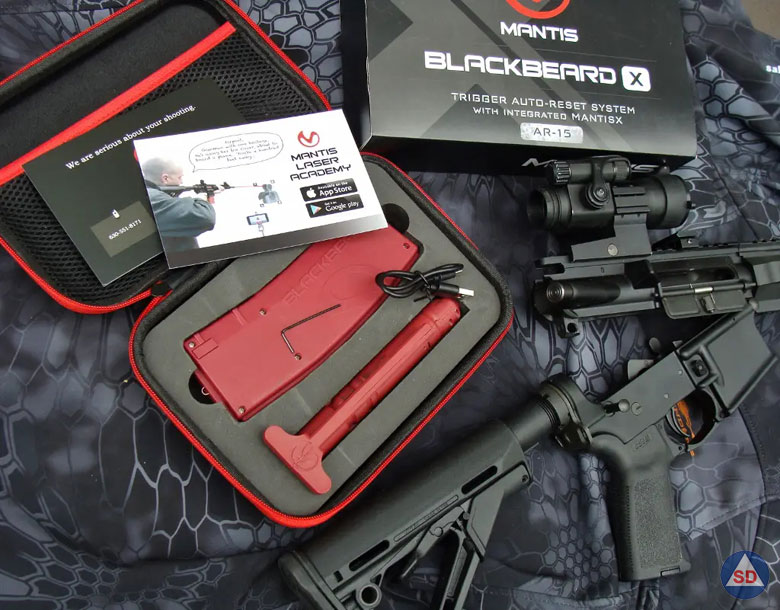
The previous elaborate and oft-irritating system I mentioned was (thankfully) procured by my cadre just as I was handing off the reigns. It provided full function for our AR-15s and S&W M&Ps but, beyond computers and projectors, its highly modified uppers ran off special “magazines” that were charged with high-pressure air. The charging process required a SCUBA tank (like todays pre-charged airguns) and the equipment intensive system required plenty of setup time. By comparison, the Mantis BlackbeardX seemed almost stupid simple.
The Firearm Components
Turns out the substitute Mantis bolt-carrier group has a battery-powered servo, located to engage and re-cock an AR-15’s hammer. Press the trigger (per normal) and the AR “fires,” projecting a laser blip through the bore while simultaneously transmitting shooter-based data to the Mantis App.
The “shot” also activates the servo to re-cock the hammer, instantaneously – to the tune of 10 shots per second! The requisite power is supplied by the “magazine”, through corresponding electrical contacts. Insert the mag and its long-lasting rechargeable “Powerbank” battery brings the system to life. Activation of a small switch on the magazine allows it to establish communication with the Mantis App, wirelessly, via Bluetooth.
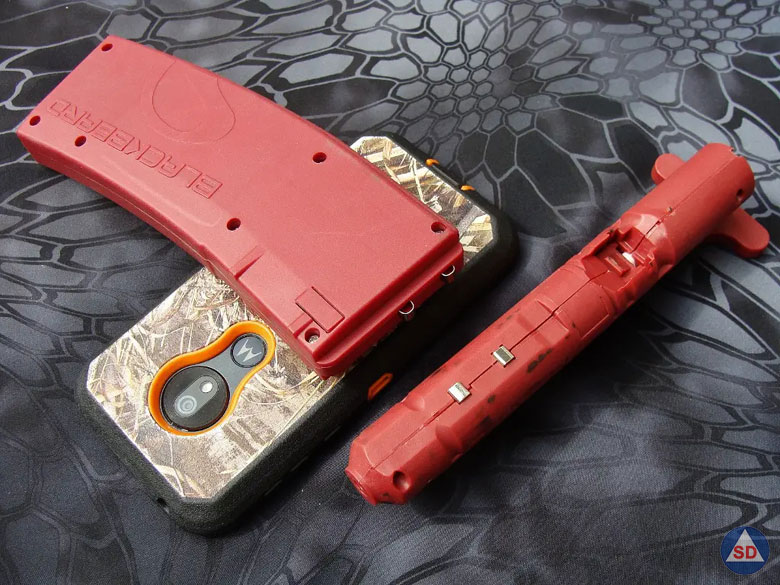
Smartphone Software
Being highly motion sensitive, the process begins by laying the AR near the phone. Next, open the installed Mantis app and tap “connect”. From there a number of useful training drills can be accessed. Basic trigger control is just the beginning. The app is the gateway to a structured progression of training regimens with valuable feedback – and coaching. A full charge will provide thousands of “shots” and the supplied USB cord can easily restore its power within a few hours.
Conversion Process
I broke out a .300 Blackout AR-15 (configured as a 10 ½” SBR) and swapped out its scope for an Aimpoint dot sight – easy thanks to QD mounts. Installation of the Mantis system was even easier; the same as a standard bolt carrier group. Clear the AR, pop its rear receiver pin, withdraw the original BCG and slip in the red plastic Blackbeard X substitute. Close the receiver halves, insert the supplied “magazine” and corresponding contacts will mate to energize the system. Simple – and also safe!
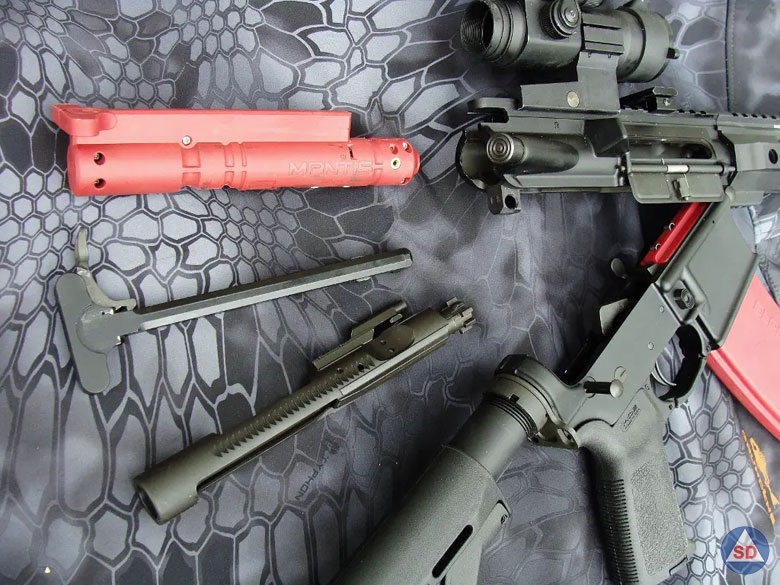
Zeroing the Laser
Once the Mantis BCG is energized, its laser can be zeroed to your AR-15 much like a conventional dot-sight or scope. Using the tip of the small supplied Allen wrench, slide a small switch downward (accessible in the ejection port), to energize the laser. Then use the wrench to adjust the pair of recessed windage and elevation screws until the laser coincides with the AR’s sights – at your chosen distance (probably room length).
Because the beam is tightly focused it’s easy to achieve a useful zero, however, the laser will always “impact” below the sights. Just like actual bullets fired from close range, this disparity is due to offset – the difference (1 ½ – 2”) between the axis of the bore and height of an AR’s sights.
Of course, since Real Men don’t read directions, I realized this after the fact. Turns out the small bore of an AR-15 won’t accommodate the necessary upward angle needed to merge the laser with your aiming system. Thus, you’ll need to live with a bit of offset, per live ammo – not necessarily a bad thing.
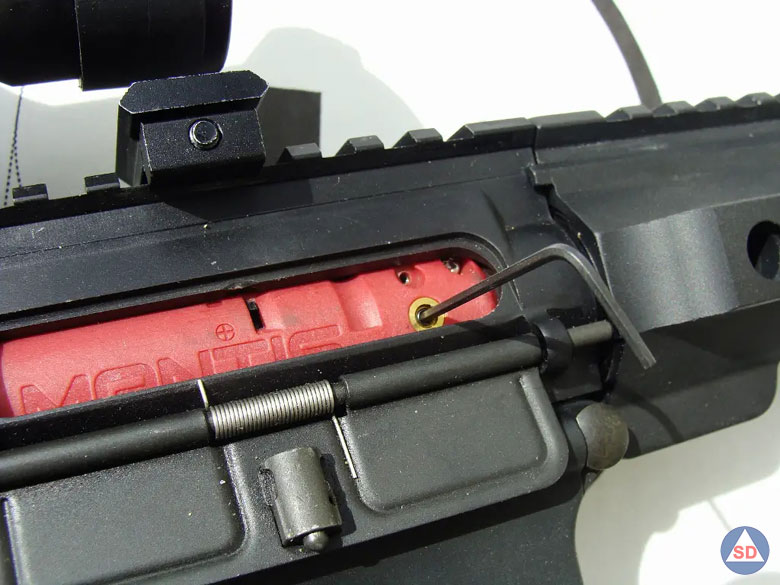
Return the small switch to its upper setting and the laser will project a brief but easily visible spot with each “shot” (outdoors in sunlight I could spot it from 20 yards against a tree trunk). My unit emits a green blip but red is another option (with IR coming). As noted above, a fully charged battery is good for lots of shots – along with valuable feedback!
Advantages & Capabilities
Beyond its simplicity and easy setup, the Mantis permits use of the rifle’s actual trigger. This permits relevant practice with feedback beyond normal dry-firing – without trips to the range.
Let’s back up to the aforementioned “ball & dummy” drill for a moment, a beneficial trigger-control exercise. Mixing a few random dummies (inert rounds) in with live cartridges allows the shooter to observe the effects of a flinch (anticipation), otherwise be obscured during recoil. As useful as this drill is, for many aspiring marksmen – particularly in urban areas – logistics can impose hurdles to include range memberships, travel expenses, time constraints, and the escalating cost of ammunition.
Or, for a one-time investment of around $300, stay put and break out the Mantis Blackbeard X. Then gain even more advantages through the structured training regimens built into the system. Not to be confused with the less expensive $200 version, this iteration is “the auto-resetting trigger system with analytics and smart feedback”. To take full advantage of its features, you can even set up a makeshift range.
Digital Coaching
After perusing the various options included with the free Mantis App, I set up a low-tech “range” in my basement consisting of three cardboard Sig Sauer Academy targets with various aiming points.
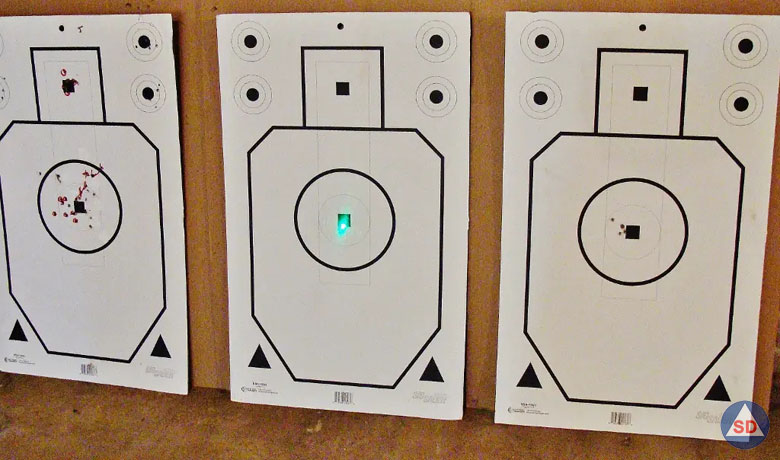
Firing up the Mantis system, the zeroed green laser was bright but tightly focused, allowing easy identification of my “hits” in artificial light. Rather than describe every drill available through this system, I’ll just touch on a few examples. You can access the full menu online through Mantis, and several independent YouTube videos – the simplest way to grasp the system’s full potential.
Worth noting is the tutorial devoted to trigger basics – the logical starting point. Like other drills, goals are presented along with comprehensive feedback and useful tips (some with short videos). There’s even a useful wheel-type chart graphic that’s relevant for rifles.
A drill I appreciated was “plates”, engaged in specified sequences per many steel reactive courses. You can program start and stop tones – just like a shot timer – and review the pertinent data in a similar manner. This includes splits (time between shots), total time – and other useful info not normally available through conventional means.
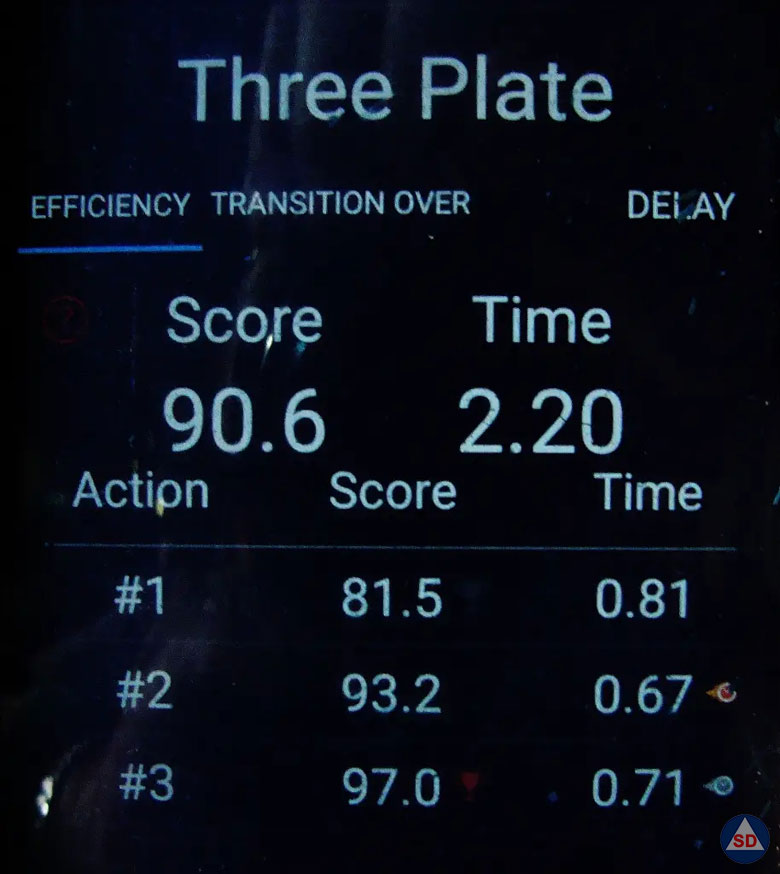
An animation even tracks the insertion of your muzzle relative to each target (efficiency), along with its movement as it relates to trigger-control. Your performance can be compared as a percentage of a “perfect” rating; 100 %. Initially, I used three paper plates set at around 10 yards. However, a similar “box drill” was a natural for the above Sig target, which turned out to be a handy all-around choice (although improvised targets will do just fine).
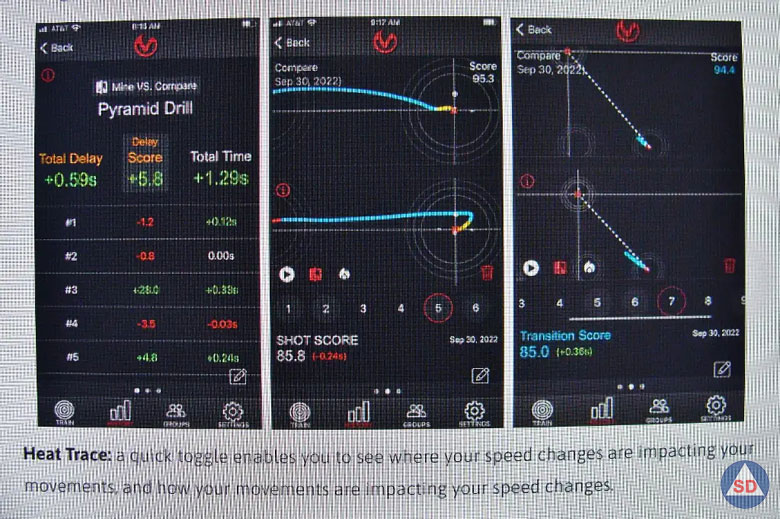
Anyhow, this is just the tip of the iceberg. Lots of cool and educational stuff to play with!
More Potential?
Although not on the list, I incorporated the above drills with a night-fire by attaching a weapon light to my AR – highly worthwhile and easy to set up by simply turning off the lights! Tight time constraints, combined with operation of the AR’s safety and the light, provided a revealing opportunity to iron out a few bugs.
Possibly, the Mantis Blackbeard’s laser could even be used for on-the-fly bore-sighting checks. Any gross deviations from the firearm’s sights should be readily apparent.
Also, I’ll be curious to see what the graphics reveal after my AR receives a trigger upgrade (the present version is nothing special).
Price check: For owners of handguns (or the more basic Mantis AR-15 kit), there are less expensive Mantis Laser Academy systems that function off laser/chamber inserts.
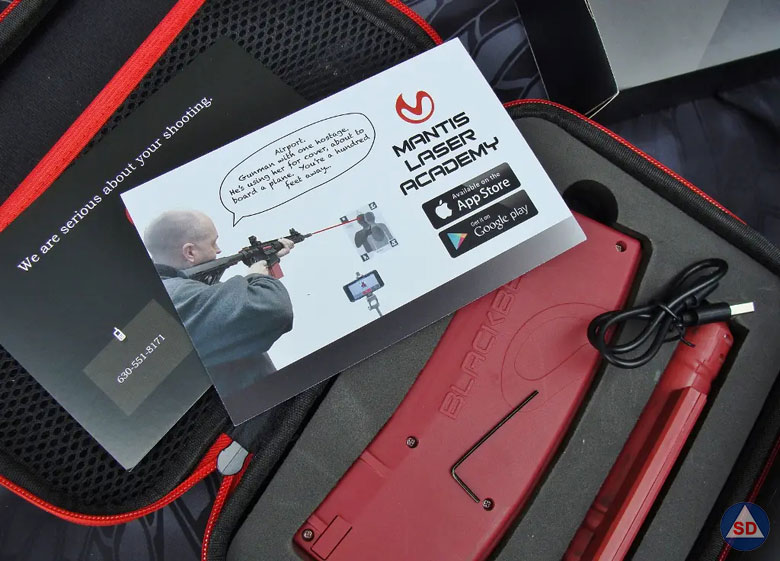
Parting Shots
For better or worse, we learn through repetition. The Mantis not only provides an economical means to refine the basics but also provides tangible feedback. However, as valuable as this technology is, it doesn’t constitute actual range time. Thus, absent concerns related to live ammo, it’s easy to get sloppy about safe firearms handling – something worth keeping in mind.
Also, as noted above, the Mantis drills should really commence with the firearm “on safe.” Stick with this regimen and you’ll be less likely to bench your AR with its safety “off” during data-driven progress checks. Get sloppy here and there’s a good chance you’ll repeat it on the range – or elsewhere.
Next tactics. Although the battery can provide thousands of trigger pulls, most of us don’t own belt fed AR-15s. Mantis does address this concern, but all of the drills are best performed per the actual capacities of your magazines. Speaking of which, those with Glock-type 9mm AR lowers are out of luck for the time being.
But the positives far outweigh the negatives. The trigger time afforded by the Mantis X provides a quantifiable means to identify problem areas and gauge progress through structured and meaningful feedback – by far the better alternative to blasting through large quantities of expensive ammo. The latter, especially if combined with poor coaching, will likely only reinforce counterproductive techniques – for more money in the long run (even 100 Blackbeard “shots” constitute real savings).
Perhaps the crowning touch of the Mantis systems is the lettering on its box: “Made in the USA.”
